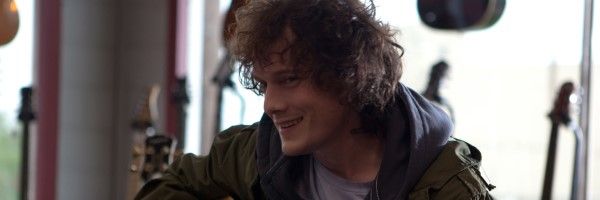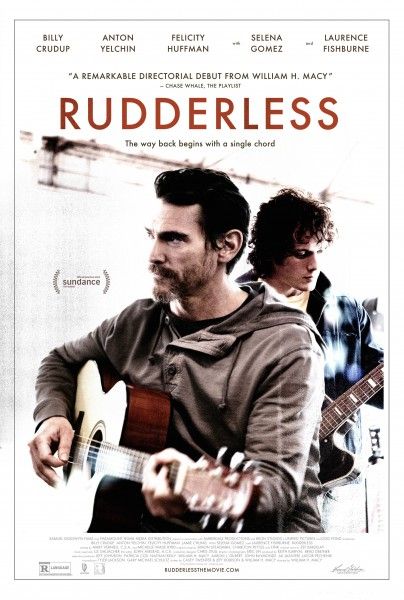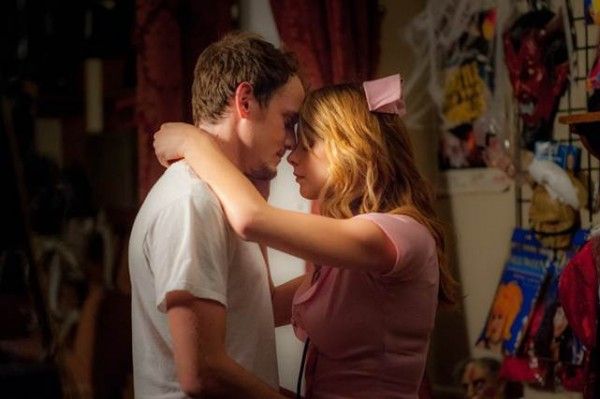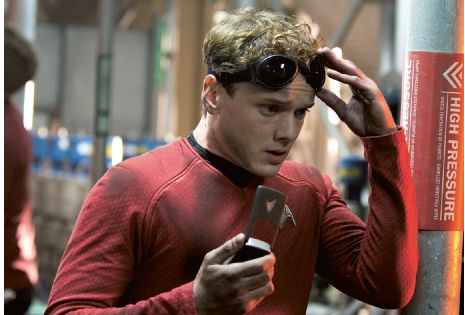Rudderless, the feature directorial debut of actor William H. Macy, follows Sam (Billy Crudup), a man whose life is torn apart by the sudden death of his son. He passes his days by drowning his pain in alcohol, until he discovers a box filled with his son’s demo tapes and lyrics, and he begins to reconnect with his son while exploring his unknown talent. When he learns and decides to play these songs in a local bar he catches the attention of a young musician named Quentin (Anton Yelchin), and the two decide to form a rock ‘n’ roll band called Rudderless.
At the film’s press day, actor Anton Yelchin spoke to Collider for this exclusive interview about selling William H. Macy on the fact that he could do the music, what it was like to get to work with these amazing songs, the type of music that really moves him, the themes the film is exploring, and how special it was to work with someone as warm as Billy Crudup. He also talked about how honored he was to get to be a part of Only Lovers Left Alive and to work with Jim Jarmusch, the privilege it was to work with Joe Dante on the zombie film Burying the Ex, and his hope to get to share some screen time with William Shatner in Star Trek 3. Check out what he had to say after the jump.
Collider: How did this come about for you?
ANTON YELCHIN: I read the script, and I’d met Bill [Macy] before, a couple of times. We were on decent terms. He’s a really, really nice man, and I’d had a bunch of conversations with him, at that point. I’d met with him and talked to him, and his biggest issue with me was whether I could play music. I had never called myself a musician, but I can mess around on the guitar. So, I got together with my buddies that I used to have a band with, and I said, “I need your guys’ help. We’ve gotta fuckin’ write a song tonight and I need to do a solo on it and sing it.” And I can’t sing. We had a punk band, so I didn’t really need to sing. So, I fudged my way through this song and did a pretty normal rock ‘n’ roll solo, and I sent that over. I sent Bill a couple of songs, and me just playing guitar, and he was like, “All right, he can play.” I think Bill’s idea was that we would actually become a band, and that we would have six months of prep to become a band and tour around. But, the reality is that that’s just not possible. He said that, even if we were the Stones, he wouldn’t have wanted us to play live. He would have wanted us to go into the studio. So, that’s how it came about for me.
What was it like to get to perform and record these songs?
YELCHIN: Charlton Pettus and Simon Steadman are the two guys that wrote the songs, and Charlton also did the production. We went to his studio and really worked on the songs. When I would jam with my buddies, if we recorded, we just did it all live. We didn’t really give a shit what it sounded like. But, we were working a click track. We had a live, raucous feel, but still made it nice. It is pop music. It’s not garage music. It has a pop-y accessible quality to it, so it has to be, to a certain extent, arranged and yet simple, at the same time. I learned a lot from sitting in the studio, especially with Ben Kweller, who is an extraordinarily gifted musician and songwriter, and is a true pro. He’s as pro as it gets. That was a lot of fun. I learned a lot from that process.
Your character is clearly deeply affected and moved by this music, when he hears it. Do you have music that does that for you?
YELCHIN: Yeah, there’s a lot of music like that. At different times of my life, it’s been different things, but the things that would answer your question have always remained. Delta blues makes me feel that way. When folk music really comes from a certain social and socio-political place, or certain social and cultural conditions, it makes me feel that way. And that’s a lot of pre-war music, really. I feel like post-war American music is really tied to a certain kind of America already, like big cities and things. The music that really moves me is music that’s written by people where there isn’t a lot of money and they’re really singing with just their voice and a guitar about their feelings and about their life. Their poetry is relatively simple, in the sense that it’s about their soul in jeopardy. That seems to be the dominant theme of Delta music, and they sing it with such honesty. It’s so simple because it’s just a voice and a guitar. There’s no amplifier and there’s no microphone. Even Chicago blues music is already moving towards rock ‘n’ roll. It’s the music of the urban environment, and big cities and nightclubs, and that’s different from a man and a guitar, wondering what his life is about. That music has always moved me, like Son House, Robert Johnson and Blind Willie Johnson, or even guys later. R.L. Burnside has qualities like that, even though he was electric. That music has consistently moved me, and a lot of classical music, too. Beethoven and Rachmaninov have never failed to really move me and be incredibly impressive to me, regardless of where I’m at in my own thinking about things.
What would you say the themes are that this film is exploring?
YELCHIN: There are two main themes in this film. One is gun violence, and the horrible plague of gun violence that we have in our culture. And the other is the healing process, and music is a big part of the healing process. Someone told me recently that they’re taking away a lot of arts programs in public schools in L.A. That, to me, is a horrible thing. I was one of the people who was okay at math, but it wasn’t that interesting to me. The humanities are an escape for a lot of people that can’t communicate things in other ways. And I think that’s a theme in the film. Sam and Quentin can’t communicate, really, to the world what they’re feeling, or don’t want to, in Sam’s case, but they’re able to through music. That’s a healing factor in the film that is incredibly important in our world.
Quentin and Sam share so much without really having many actual conversations. What was it like to work with Billy Crudup on this?
YELCHIN: It was great. Billy is just a very warm, kind, intelligent person, and he opens that up to you. You just feel that right away. Connecting with him and sharing things with him came very easily to me, and I really enjoyed our time together. He’s a wonderful actor, so that connection was there, but it’s an extra special thing when someone is warm to you, as a person. I think it adds something else to your working relationship and to the relationship on screen. They’re not really communicators. Quentin stumbles through the things he’s saying. Sometimes he’s speaking so fast and saying so much, as a protective device. He’s not often saying what he wants to say. And Sam just isn’t saying much, at all. What they’re saying is when they play music together. Anyone who has played music together feels how much communication happens without having to actually speak to one another.
At a time when many people were hoping that, after the success of Twilight, vampire movies would go away, at least for awhile, Only Lovers Left Alive came along and really turned out to be one of the best vampire films ever made. What was that experience like, and what attracted you to that project?
YELCHIN: I’m a tremendous Jim Jarmusch fan, and I have been for a long time. I think Jim is just a magical filmmaker and magical human being. He’s someone who is incredibly committed to music. Music has always been a fundamental part of his films, with people listening to music, people dancing to music, and having musicians in his films. The day that I heard that Jim Jarmusch wanted to talk to me on the phone was one of the highlights of anything I’ve ever done. I feel so honored to be in that film, and I love that film. People say it’s a vampire film, but it’s really a Jarmusch film. Vampyr is a [Carl Theodor] Dreyer film, more than a vampire film. It’s in that category of films that use the genre, but are really their own thing. It’s funny, I recently rewatched it. I was watching it with my folks, and I don’t really like watching my work. I don’t mind watching it when I was a little kid because I forgive myself a lot, since I was a little kid. But, I really like the film so much. I just watch it like a Jarmusch film, and I get so many things form it. It’s really dense without ever feeling too dense. It’s wonderful. I love it. And it never particularly hammers anything home, but tells you so much about so many feelings and ideas. I feel like Jim’s films are like that, though. They’re very subtle and odd and beautiful.
Burying the Ex sounds like its own original take on the zombie genre. Was that the appeal of that film, as well?
YELCHIN: It was also Joe Dante. I’m really attracted to filmmakers. If there’s someone that has created what we understand as horror camp, it’s Joe, especially in the ‘80s. When you look at ‘80s horror camp, Joe is the name of ‘80s horror camp. And I think Joe’s films are brilliant because they use the genre to be completely about something else. Usually, they’re just about genre, and they’re about the infiltration of genre into our lives and vice versa. I feel the same way about Burying the Ex. Burying the Ex, to me, is a film about whether this guy is living a genre film, or genre films live through him. He literally is a movie fan, and he ends up in one of his own movies, or a movie he would like. That’s a very Joe Dante thing. Alan Trezza wrote the screenplay, but Joe Dante is the filmmaker that makes films like that. So, I had a wonderful time with Joe. I have tremendous admiration for him. I’ve never met anyone that knows more about films. He’s an encyclopedia of cinema knowledge. It’s a real privilege to be around him and to hear him talk about movies, and to have him give you DVDs and tell you what to watch.
It recently came out that there’s a cameo available for William Shatner in Star Trek 3.
YELCHIN: Yeah, I read that.
Are you excited about the possibility about getting to share screen time with him?
YELCHIN: Totally! Absolutely, yeah! I don’t know anything about the project yet. They keep it under wraps until the last minute, for the world and for us. But if that is indeed true, William Shatner is one of the biggest icons in American pop culture. To be around him would be really incredible. He’s Captain Kirk. It would be like being with Leonard Nimoy, who’s also really incredible.
Have they told you when it will start shooting?
YELCHIN: I think next year. All I really know is that they’re probably going to shoot it next year. They really do keep it under wraps for everyone involved, really, until it happens and they’re like, “Now, you show up for four or five months.” But, I have a fun time doing it. It’s a lot of fun. But, that’s Bad Robot’s process.
Are you going to shoot something else before then?
YELCHIN: Yeah. I finished two films over the summer, and I’m starting work on another film. And then, there might be an improvised film that I’ll do with a filmmaker named Gabe Klinger. I think I’ll have time, during the fall, for something. We’ll see what happens. I think Star Trek may be in early spring, but I don’t know exactly when. And once you’re there, you’re there.
Rudderless is available in theaters and VOD on October 17th.




